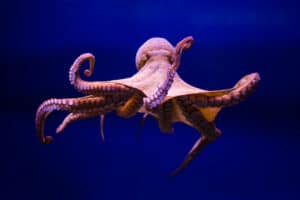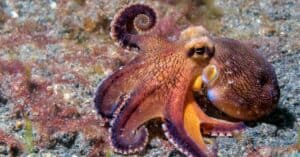Quick Answer:
- Researchers think that octopuses gave up their shells for greater freedom of movement to find food.
- This enabled them to reach into all sorts of small places to get food.
- These challenges could have pushed octopuses to evolve to a higher level of intelligence.
Octopuses are incredibly intelligent animals! They recognize individual human faces, have their own unique personalities, use tools, solve puzzles, play, and can disentangle complex problems. Even though they are invertebrates, they are now being studied on the same level as vertebrates like dolphins and chimpanzees. Octopuses, however, are wired very differently from these animals. So, what it is that makes octopuses so smart? Let’s take a closer look!
The Evolution of Octopuses Might Be Why They Are So Smart
Octopuses are a group of mollusks — like clams and oysters — yet they do not have a shell. According to researchers from the University of Cambridge, this is precisely how octopuses became so much smarter than other mollusks. Their ancestors once had shells. By giving these up, octopuses could move their bodies around with more freedom, and reach into all sorts of small places to get food. With more food options available, they needed to become smarter in order to find it. Researchers believe that these challenges pushed octopuses to evolve to a higher level of intelligence.
However, without a shell octopuses also became more vulnerable than their ancestors, which could also contribute to why octopuses are so smart. This vulnerability likely prompted them to evolve new tactics like their incredible color, texture-changing skin, and their creative use of tools. They also became much more flexible in their movements and in the way they think.
Another group from the Queensland Brain Institute studied the brain structure of octopuses. The group studied four octopus species from different habitats and found that each species actually had a different brain structure from the next. For example, the octopus living in deep sea waters had a smoothed brain structure that was well-suited for the slow life that they led and because they didn’t interact with many other animals. On the other hand, the reef octopuses had bigger brains that were suited for social interactions, cooperation, and complex visual tasks.
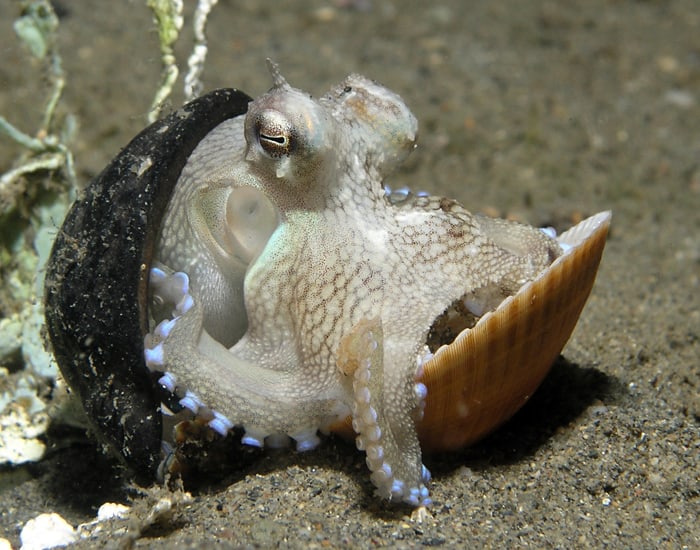
Octopuses have been known to use coconut halves as shields. Here Octopus marginatus hides between two shells.
Octopus Brains
Mollusks have groups of nerve cells, called ganglia. These can be found all over their bodies, and different ganglia control different functions in the body. However, in octopuses, these ganglia come together to form one central brain, with two specialized areas for storing memories like humans.
An octopus’s brain-to-body ratio is quite impressive and is similar to that of other intelligent animals. They have complex nervous systems and hundreds of millions of neurons — but these are not concentrated in one big brain as you might expect. Instead, they are spread out through the interconnected ganglia and organized into three main areas:
- The central brain is found in the head of an octopus (where you might expect it to be). However, it only holds about 10% of the octopus’s neurons!
- There are two huge optic lobes that contain around 30% of an octopus’s neurons.
- Then, there are an astounding 60% of an octopus’s neurons found in its tentacles! That’s like having more than half of your neurons in your arms and legs!
In other words, an octopus has one central brain with two huge optic lobes, along with eight other mini-brains — which means that an octopus actually has nine brains. No wonder octopuses are so smart! Basically, each of an octopus’s eight tentacles has a mind of its own and can think for itself, rather than having to wait for the central brain to give it a command. This means that an octopus has an endless supply of creativity and flexibility for facing new situations and solving complex problems.
Octopus Genetics and Intelligence
Scientists believe that octopuses may have something else in common with humans: transposons. Transposons are tiny parts of the DNA that can “jump” or move around and change location inside the genome. This happens a lot when different species evolve. In humans, transposons make up 45% of our DNA.
Recently scientists also discovered that two types of octopuses — Octopus vulgaris and Octopus bimaculoides — also have many transposons in their genomes. Even though octopuses are invertebrates and in many ways seem completely foreign compared to vertebrate animals, they have a unique behavioral and neural plasticity that allows them to learn and solve problems like mammals, which is another reason why octopuses are so smart.
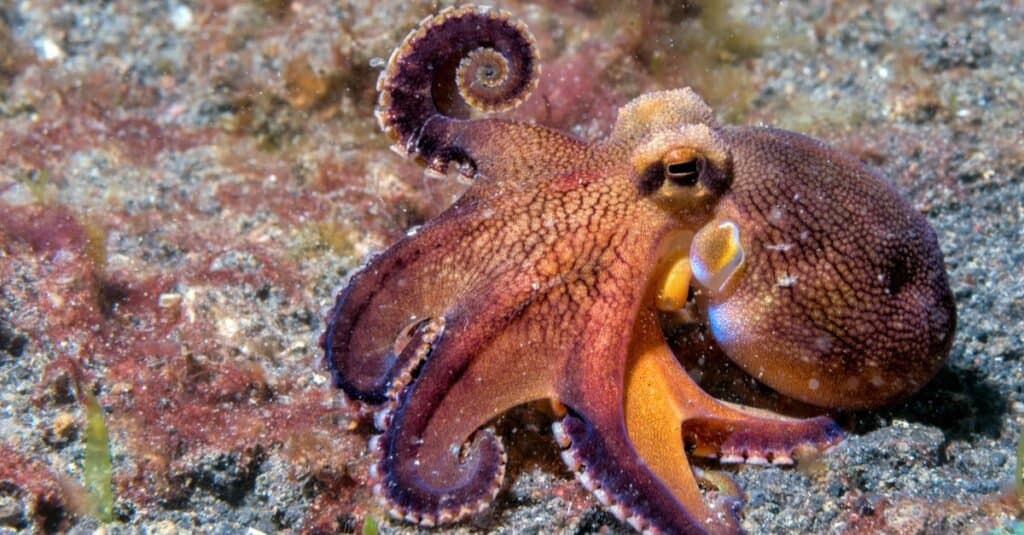
Octopuses can escape tanks, open child-proof bottles, and solve complex puzzles.
©Andrea Izzotti/Shutterstock.com
Octopus Intelligence in Action
Octopuses show off their incredible intelligence in all kinds of fascinating ways. They have been recorded picking up two halves of a coconut and using them as a shield, playing with scuba divers and caretakers, planning ahead and learning from their mistakes, opening child-proof bottles, navigating mazes, calculating solutions to complex puzzles, and escaping from “escape-proof” tanks.
Octopus Escape Artists
Octopuses have sharp eyesight, a complex brain, and the capacity to learn and form mental maps. They demonstrate these incredible skills in many ways, but one of the most common is their aptitude as expert escape artists.
One famous example of this comes from the Brighton Aquarium in London back in May 1873. The aquarium staff started to notice some of their lumpfish were disappearing from their tank. In fact, nearly every morning another lumpfish was missing, without any trace of what had happened to it. This lumpfish mystery confused the staff. There were no other animals in their tank to eat them, the substrate wasn’t deep enough to bury in, and they weren’t slim enough to jump out of the tiny openings in their tank. If the lumpfish were dying, there would surely be signs of their bodies, but nothing was found.
Then early one morning one of the staff happened to discover one of the aquarium’s octopuses hanging out in the lumpfish tank! Apparently, the octopus would somehow slip out of his own tank in the middle of the night (an amazing feat in itself), trek over to the lumpfish tank for a midnight snack, and then return home before morning.
Of course, this isn’t the only escape-master octopus in history. Back in 2009, an octopus named Sid escaped his tank multiple times before his keepers finally released him back into the ocean. Once he even tried to hide out in the drainage system! Then in 2016, Inky the octopus escaped from the National Aquarium in New Zealand. Inky slipped out of his tank, slinked across the floor, and escaped through a 6-inch wide drainpipe that conveniently led out to sea.
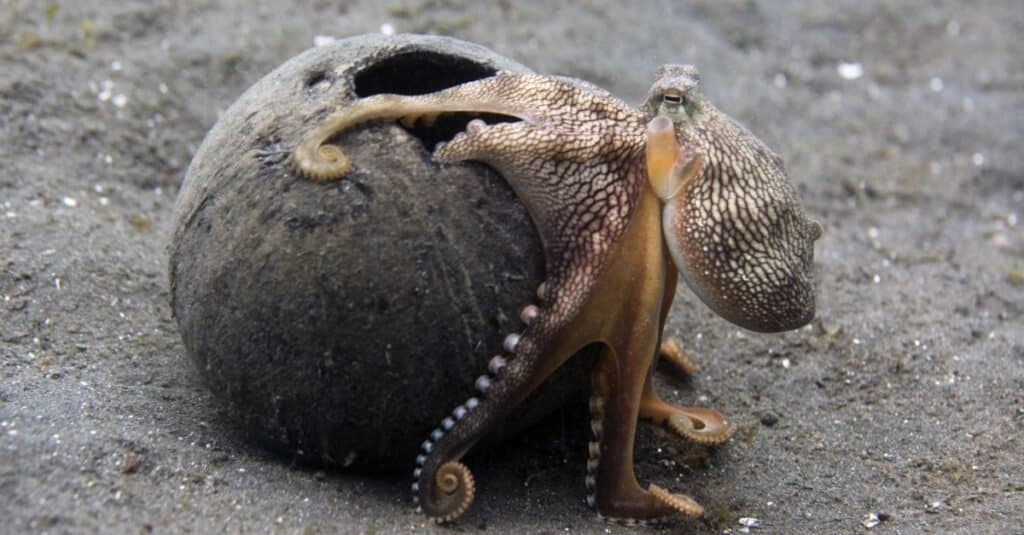
This coconut octopus is walking on a sea bottom with a big coconut shell which it can use as a shield.
©Agarianna76/Shutterstock.com
Octopuses and Play
Play is another sign of intelligence in animals, and octopuses definitely like to play. In fact, octopuses commonly ignore food if they have the opportunity to play instead.
Jennifer Mather, a comparative psychologist at the University of Lethbridge, has spent over 35 years studying why octopuses are so smart. Along with a colleague at the Seattle Aquarium, Mather presented octopuses with a boring situation to see if they could come up with creative ways to keep themselves entertained.
Mather put the octopuses in a plain tank with nothing other than a floating pill bottle. After the fourth attempt, a few of the octopuses began to play. The octopus would blow a jet of water at the floating pill bottle, sending it over to a water jet in the corner of the tank. The water jet propelled the pill bottle right back to the octopus. Two octopuses continually did this more than 20 times in a row!
Mather explains that what the octopuses demonstrated here was a lot like what we do when we bounce a ball. We’re not trying to get rid of the ball when we throw it down to the ground or against a wall. We’re simply exploring what the ball will do and all the possibilities of playing with it.
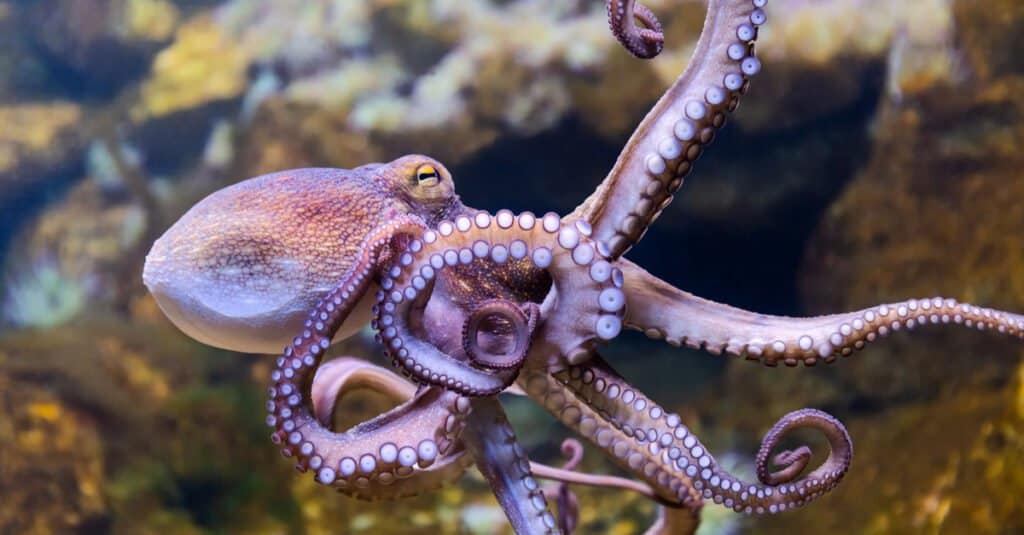
In a surprising show of forethought, an octopus can plan ahead.
©Henner Damke/Shutterstock.com
Curiosity and Creative Thinking in Octopuses
Another way to look at this is that octopuses are intelligent animals, and as such, they are extremely curious and get bored easily! Octopuses are remarkably creative and perceptive creatures with an insatiable appetite for play. They can break out of tanks secured by blocks of concrete in search of entertainment. They can even visit other tanks looking for something to do.
Octopuses can undo screw-top jars, childproof pill bottles, and hamster balls with ease. Many can even learn shapes and colors, and even use tools. Additionally, stories abound of octopuses solving mazes, and even stealing underwater cameras from scuba divers just to take them apart, piece by piece. In other words, octopuses really like to play!
Another great example of this is the story of Otto. Otto was an octopus who continually pranked the staff at the Sear Star Aquarium in Germany. For several days the aquarium’s power kept going out. During the day maintenance workers would fix it, but by the next morning, the electrical system was shorted out again.
Finally, a few staff members decided to stay the night and keep watch for any vandals at the aquarium. Turns out, there was just one vandal responsible for the blackout — the aquarium’s octopus, Otto! The aquarium staff had trained this six-month-old cephalopod to squirt water at visitors. However, Otto decided to take his newfound skill to the next level. He used his incredible octopus intelligence and connected that squirting water at the 2,000-watt spotlight above his tank (rather than at visitors) caused some rather entertaining commotion.
Octopuses Using Tools
Tools are not an uncommon aspect of octopus life. In fact, the common blanket octopus is conveniently immune to the toxicity of the Portuguese man-of-war. However, this octopus knows that the Portuguese man-of-war is deadly to other sea creatures. So, the blanket octopus rips the tentacles from Portuguese man-of-war animals and carries them as weapons to use against other predators in the sea!
Octopuses have also been observed lugging around two halves of a coconut shell as they move along the ocean floor. When the octopus sensed danger, it immediately pulled the coconut shell halves together and climbed inside like a protective tank. Some octopuses have even been seen attempting to “walk” while holding the coconut shells around them as a protective shield, which as you can imagine is quite the sight.
Octopuses commonly spray jets of water to clear sand off of shells and rocks, or to clean away from their dens. These clever creatures use stones and shells they’ve cleaned to build dens and create protective shields at the entrance.
The photo featured at the top of this post is © Daniel Eskridge/Shutterstock.com
Thank you for reading! Have some feedback for us? Contact the AZ Animals editorial team.



